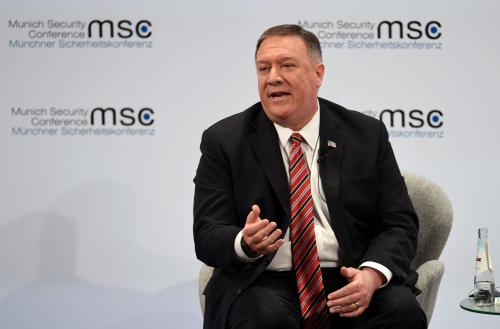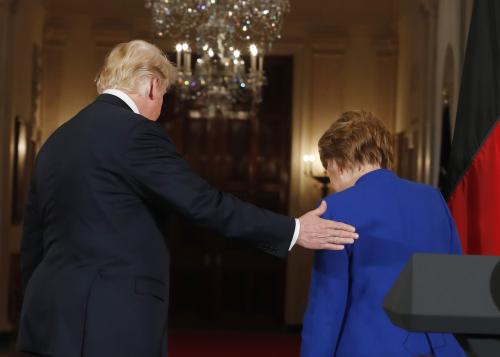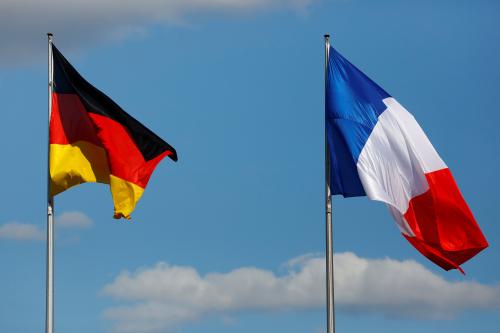The Munich Security Conference is the Western security community’s version of Thanksgiving weekend. The narcissisms of minor difference are on florid display as the allied family meets to snipe, squabble, and fight. Displays of harmony are, if anything, even more theatrical. For the non-Western guests, some of whom come from actual war zones—or at least from regions far more deprived of prosperity and good governance than North America or Europe—it must be quite strange.
In this at least, last weekend’s conference was no different than usual. But it should be clear that the February 2017 meeting was a watershed moment for the family, and for the alliance. Not a divorce moment, nor even a parting of the ways. But we will look back on it as the moment in which we fundamentally reassessed not just the division of our responsibilities, but the reliability of our allies.
Yes, Europe got assurances from three cabinet members of the Trump administration—Vice President Mike Pence, Secretary of Defense Jim Mattis, and Secretary of Homeland Security John Kelly—that the United States still stands by NATO. The vice president even swung through Brussels on his way back to Washington and extended that commitment to the European Union, reassuring worried Europeans who had noted its absence from any of the remarks by American officials in Munich.
Conversely, a string of European officials—from NATO’s Jens Stoltenberg, the EU’s Federica Mogherini to Germany’s chancellor Angela Merkel and her foreign and defense ministers Sigmar Gabriel and Ursula von der Leyen—assured their audience that they had heard the message that Europe needs to bear a larger part of the burden of its own defense.
But Europeans (including me) also noted that while Pence and others said they spoke for Trump, the POTUS Twitter feed, and indeed the president himself, were focused on rather different issues: a campaign rally in Florida, immigration in Sweden, and the trustworthiness of the media. On Tuesday, the Reuters news agency ran a piece about a pre-Munich conversation between Stephen Bannon and Germany’s ambassador Peter Wittig which, if true, confirms that the senior presidential adviser has a far more hostile take on the EU.
What Munich taught us is that the battle lines in the administration are now drawn.
And so Europeans, while somewhat reassured that senior cabinet figures have their back, are left to wonder which narrative of Europe will win out in the end: the benign version of an alliance that is necessary but needs upgrading—or the dystopian vision of an undemocratic leviathan that is inimical to U.S. trade and security interests and needs to be disaggregated. What Munich taught us is that the battle lines in the administration are now drawn. That in itself may consume so much energy that Europe will be left largely to fend for itself at a time when fires are lapping at its doorstep. Even if the pro-NATO stance wins in the end, it is clear that alliance solidarity will now be measured by allies’ defense budgets.
The feelings of Europe’s strategic community about all this are deeply mixed. There is broad agreement among policymakers, media and the public that Europe needs to take on much more responsibility for its own security. When Germany’s Der Spiegel magazine writes “Donald Trump is right“ in its lead editorial, you know times have really, really changed.
But the prospect of a United States that sees Europe—to be precise: the EU and those of its members that have not (like Hungary) drifted into the illiberal camp—as the enemy in a trade war or a Judeo-Christian crusade against Islam is appalling. So governments are racing to D.C. to befriend what they see as the rational elements in this administration.
[W]hat counts in defense is not the bucks you spend but the bang you get for them.
As for defense spending: Most European experts (and many in Washington) deplore the fact that whether or not a government spends 2 percent of its GDP on defence has now become the ironclad benchmark of alliance solidarity, because—simply put—what counts in defense is not the bucks you spend but the bang you get for them. Defense ministries (and industries), having learned to live with sinking budgets since the end of the cold war, can hardly believe their luck. But they also know: Europe can only be defended if it develops a genuinely European investment approach that spans the whole spectrum from social resilience to hard-edged military power. Replacing U.S. capabilities (for those cases where Washington can’t or won’t lend them to Europe, which seems increasingly likely) will be a huge challenge—with the nuclear deterrent as the hardest conundrum of all.
What that means, of course, is that Europe’s defense is ultimately a challenge for Europe’s political resolve—a quality currently in short supply. Amid a raging tide of homegrown populism, European politicians and policymakers are hoping that the 45th president of the United States might be the single greatest unifier of Europe since World War II.
The Brookings Institution is committed to quality, independence, and impact.
We are supported by a diverse array of funders. In line with our values and policies, each Brookings publication represents the sole views of its author(s).







Commentary
Munich: A watershed moment for Europe
February 23, 2017